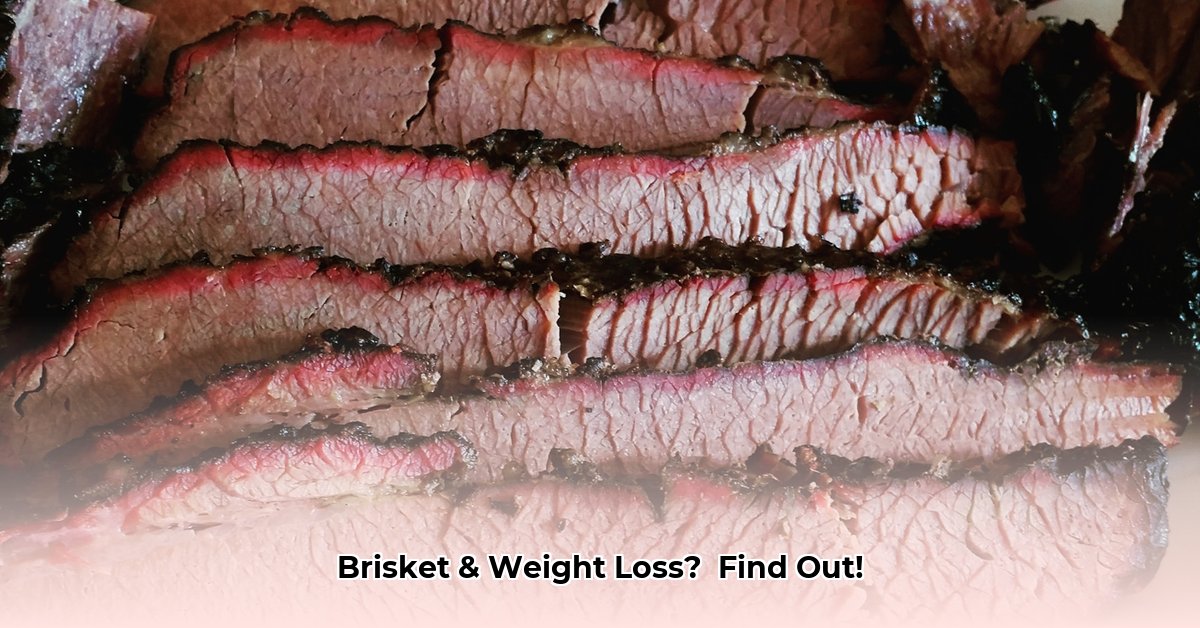
Understanding Brisket's Nutritional Profile
Can you enjoy delicious brisket and still lose weight? The answer is complex. Brisket, a cut of beef from the cow's chest, offers significant nutritional benefits, but also potential drawbacks regarding weight loss. Let's break down the nutritional profile to understand its impact.
Brisket is a powerhouse of protein, crucial for building and maintaining muscle mass, which boosts metabolism and aids weight loss. It also contains oleic acid, a monounsaturated fat found in olive oil, linked to improved heart health. However, it's also high in saturated fat, which can negatively impact cholesterol levels if consumed excessively. Additionally, depending on preparation, brisket can be high in sodium, contributing to water retention and potentially raising blood pressure. Finally, high-heat cooking methods can produce potentially harmful compounds.
Key Nutritional Points:
- High in Protein: Essential for muscle growth and metabolism.
- Contains Oleic Acid: A healthy monounsaturated fat beneficial for heart health.
- High in Saturated Fat: Excess consumption can negatively affect cholesterol.
- Can be High in Sodium: Contributes to water retention and potential blood pressure issues.
- Potential Carcinogens: High-heat cooking methods can create harmful compounds.
Factors Influencing Brisket's Health Impact
Several factors significantly impact brisket's overall health impact and suitability for weight loss. These include cooking methods, animal sourcing, trimming, and marinades.
Cooking Methods: Low and Slow vs. High Heat
The cooking method dramatically alters brisket's nutritional profile.
- Gentle Methods (Boiling, Steaming, Braising): These retain nutrients, minimize fat loss, and significantly reduce the formation of potentially harmful compounds created by high heat.
- High-Heat Methods (Grilling, Smoking, Searing): While delivering a desirable smoky flavor, high-heat cooking can create heterocyclic amines (HCAs) and polycyclic aromatic hydrocarbons (PAHs) – compounds linked to an increased cancer risk. Moderation and careful attention to prevent charring are key. Trimming away burnt areas is crucial.
Animal Sourcing: Grass-fed vs. Grain-fed
Grass-fed brisket generally boasts a more favorable fat profile than grain-fed brisket, containing higher levels of beneficial omega-3 fatty acids and lower levels of saturated fat.
Trimming: Cutting Down on Fat
Meticulously trimming visible fat before cooking significantly reduces the overall fat and calorie content. This simple step makes a considerable difference in the health impact of your brisket.
Marinades: Flavor and Potential Health Benefits
Marinades enhance flavor, but some, particularly those with acidic ingredients (lemon juice, vinegar), may also contain antioxidants counteracting some negative effects of high-heat cooking.
Brisket and Weight Loss: A Balanced Approach
Can brisket fit into a weight-loss plan? Yes, but strategically. It shouldn't be a daily staple, but rather an occasional treat within a balanced diet. Remember, sustainable weight loss hinges on holistic lifestyle changes, not just eliminating specific foods.
Actionable Steps for Healthy Brisket Consumption
- Choose Lean Cuts: Opt for leaner cuts of brisket with minimal visible fat. Consult your butcher for guidance.
- Prioritize Gentle Cooking: Favor low and slow cooking methods like boiling, steaming, or braising to minimize harmful compound formation.
- Trim Fat Aggressively: Remove excess fat thoroughly before and after cooking.
- Utilize Marinades: Employ acidic marinades to enhance flavor and potentially reduce the formation of harmful compounds.
- Master Portion Control: Consume brisket in moderation as part of a balanced diet including plenty of fruits, vegetables, whole grains, and other lean proteins. Don't overeat!
Conclusion: Moderation and Mindful Preparation are Key
Incorporating brisket into a weight-loss diet requires mindful preparation and portion control. By choosing lean cuts, employing gentler cooking methods, trimming excess fat, utilizing healthy marinades, and integrating brisket into a balanced diet, you can enjoy this delicious meat without jeopardizing your weight loss goals. Remember, the key is moderation and a holistic approach to healthy eating.
Resources
UCLA Health: Grilling Meat and Cancer Risk (Provides additional information on minimizing carcinogens from grilling.)